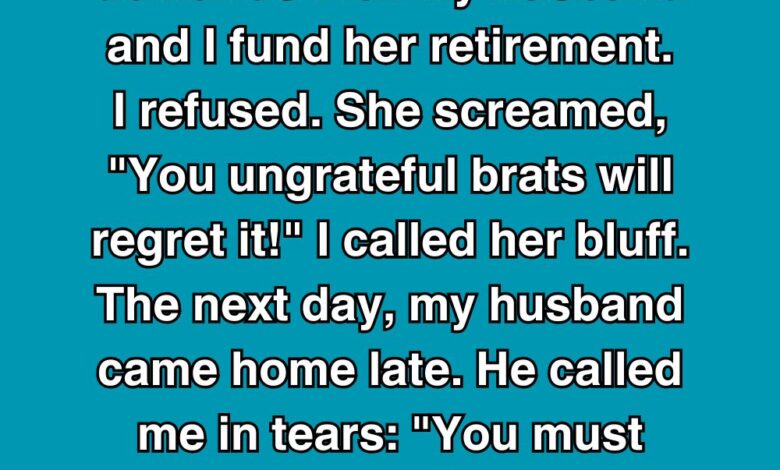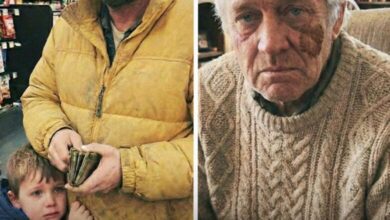
My Mother-In-Law Gave Everything To Her Other Daughter—Now She Expects Us To Save Her
I thought she was bluffing.
When my mother-in-law, Nilofar, told us we’d “regret” refusing to fund her retirement after she gave everything to her other daughter, I assumed it was another performance. We live in a modest two-bedroom, juggling a toddler and student loans. She’d signed the big family house, the car, the bonds—down to the heirloom rugs—over to Soraya, her favorite. It was her choice. Then Soraya wouldn’t take her in, and suddenly we were “the only ones who truly care.” We said no. Boundaries. That was the line.
The next day, my husband, Malek, called me from his mother’s driveway, voice shredded. “You have to come. Now.” I drove over braced for theatrics and found two squad cars idling a few houses away. Malek looked five years older, clutching his phone like it had caused this. “She reported me,” he said. “Says I stole from her safe. Jewelry and eight thousand in cash.”
Inside, Nilofar sat on the couch with tea, composed. “Ah. She came,” she said in Farsi, not looking up. “Good. Someone can talk sense into my son.” I told her exactly what I thought of accusing her own child of theft. She stood slowly, eyes cool. “I gave thirty years to this family. I deserve dignity, not to be discarded.” We’d heard it all before. The officers questioned Malek, but with no witnesses or footage, it became a report and nothing more.
Driving home, he was silent, the steering wheel whitening his knuckles. That night, he said, “I’m done,” and I realized he didn’t just mean with his mother. He meant with being the “good son” people rely on to fix their messes.
Nilofar tried to reset the clock. A casual voicemail: “I’m making stew. Come by.” We didn’t. Two weeks later, a tearful message about being lonely and abandoned. We didn’t. Then the letters came—from a lawyer. She was suing for elder neglect, claiming we had a verbal agreement to support her, that we “promised” care after she gifted the house to Soraya, that Malek had manipulated her into giving away assets. She’d drop it, the letter said, if we mediated—i.e., paid monthly and placed her in a condo “near family.”
We hired an attorney. It wasn’t a bluff. Discovery has a way of unearthing what people don’t say out loud. Our lawyer called one afternoon, breathless: “Soraya sold the house three months ago.” Below market, to her husband’s cousin. A rush sale. Nilofar wasn’t a benefactor; she’d bartered security for assets and got played. Soraya flipped the deed, pocketed the cash, and parked her mother in a cheap rental—peeling paint and echoing rooms.
Rage and pity don’t usually coexist, but there they were, elbowing each other. What she’d done to us was unforgivable. But humiliation has a way of shrinking people. Two days later, Soraya texted: “Can we talk? Mom’s spiraling. She found out about the sale.” Malek ignored it; I didn’t. We met at a café. She looked frayed around the edges—designer bag, chipped nails, tired eyes. “I didn’t think she’d sue you,” she said. “We were drowning after Kian lost his job. I needed the money.” Then she added, quieter: “She’s sick. Early-onset Parkinson’s. She’s shaking more. Forgetful. Scared.”
I sat with that. The part of me that wanted to stand up and leave, and the part that remembered everyone is someone’s child. “We’ll think about it,” I said.
Malek took a beat, then made calls. He drove Nilofar to a new doctor for a second opinion. Parkinson’s, early stage—confirmed. He called Soraya and told her to drop the lawsuit immediately or we’d go public with the house sale and the paper trail. She agreed.
We didn’t reconcile. Not then. But something in Nilofar softened. Maybe illness humbled what pride hadn’t. Maybe betrayal from the “golden child” did what our boundaries never could. A month later, she left a voicemail with three words I didn’t expect to hear from her: “I’m so sorry.”
Forgiveness is not a door you fling open after one sentence. It’s a slow latch. We started small: groceries delivered to her place, a nurse twice a week. No speeches. No promises we couldn’t keep. Then one afternoon Malek found a small box on our doorstep. Inside were two old gold bangles, dented at the edges, one clasp engraved with his name. “They were her mother’s,” he said quietly. “She’s trying.” I nodded. Trying matters.
We kept our lines firm. She won’t live with us. We won’t empty savings to fix choices that weren’t ours. But she eats. She sees a doctor. We answer more often than we used to. Not because she earned it, but because our son is watching. One day he’ll remember how we carried this: the hurt, the hesitation, and the choice to be decent anyway.
People expect neat endings—reunions, red bows, a final reckoning. Real life is messier. Sometimes the person who breaks you needs you. Sometimes the “favorite” burns the bridge and hands you the match. Grace isn’t about who deserves it. It’s about who needs it, and the person you become when you could cling to a grudge and choose not to.
We’re okay with the gray. Boundaries and compassion aren’t opposites; they’re the rails that keep you from derailing yourself. If there’s a lesson here, it’s that strength isn’t winning arguments or collecting apologies. It’s choosing love without surrendering your sanity—and letting the people who once used guilt as currency learn, finally, that the price has changed.




